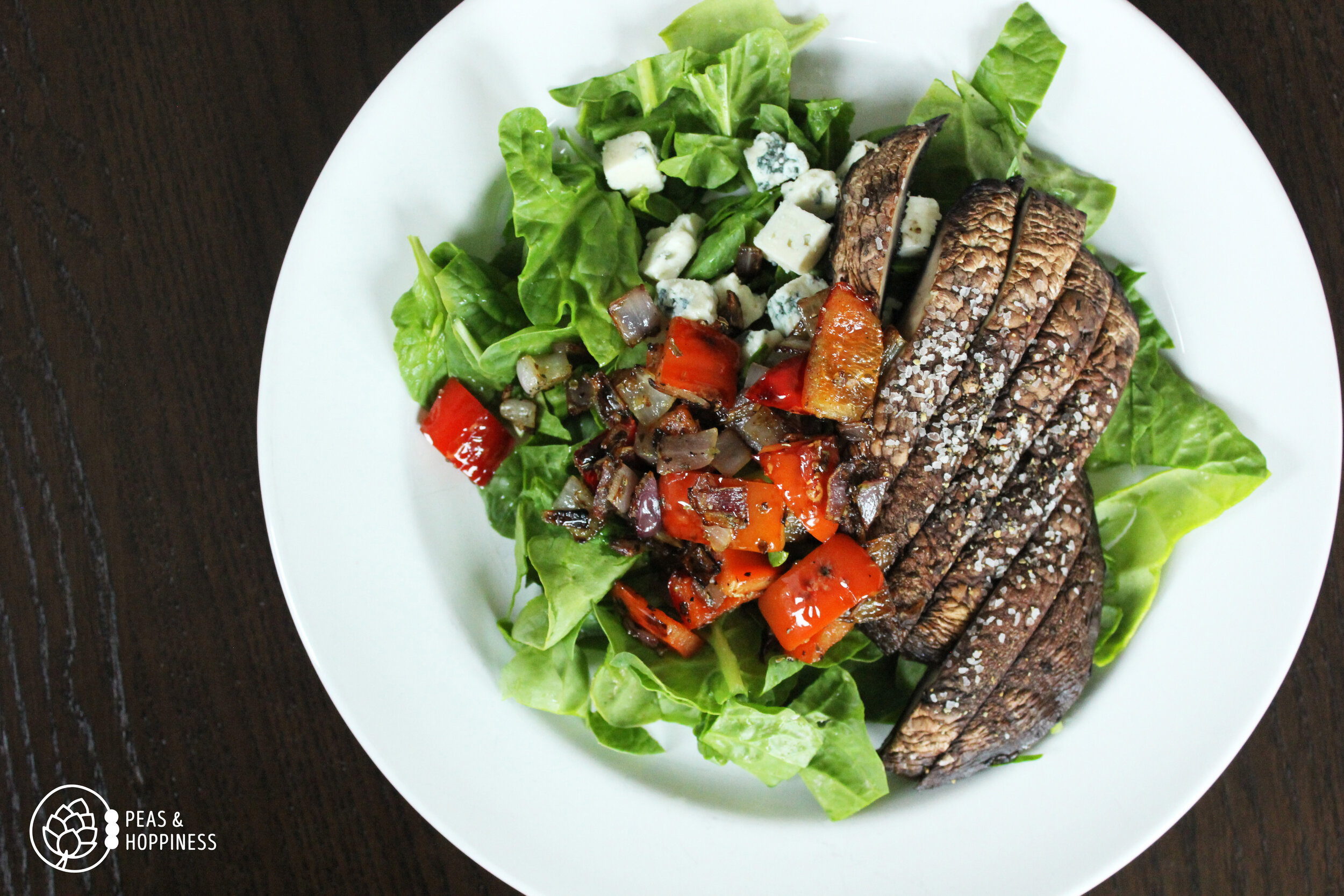
Black & Blue Portobello Salad featured on the Vegetarian Peas & Hoppy Meal Guide
In 2016 a nationwide poll of Americans showed approximately 3.3% of people identify as vegetarian or vegan (1).
For reasons from environmental to animal ethics to health, the vegetarian diet has become more popular recently in the United States. Many cultures and religions have encouraged vegetarianism for thousands of years, but documentaries like Forks Over Knives and the awareness of the environmental impact of food choices have recently increased the popularity of a meatless diet.
What is the Vegetarian Diet?
There are different versions of the vegetarian diet; understanding the key differences is important to understand the health benefits and possible nutrient deficiencies of each.
Lacto-Ovo Vegetarian: Lacto = milk / Ovo = egg. Thus, a lacto-ovo vegetarian is a person who consumes dairy and eggs, but no animal flesh or fish. Using this same logic, a lacto-vegetarian consumes dairy but not eggs; an ovo-vegetarian consumes eggs but not dairy.
Vegan: the strictest form of a vegetarian diet, which includes only plant-based foods and eliminates all animal products including dairy and eggs. Some vegans also avoid foods like honey and omega-3 oil supplements derived from fish, which also come from non-plant sources.
Pescatarian: a plant-based diet which restricts animal flesh, but includes fish. Usually also includes eggs and dairy.
Flexitarian: also called “semi-vegetarians;” a relatively new trend in which a person eats a mostly vegetarian diet but occasionally consumes meat and fish. There is not a hard and fast rule about what determines a “flexitarian,” but the trend is towards a plant-based diet without animal products as the focus.
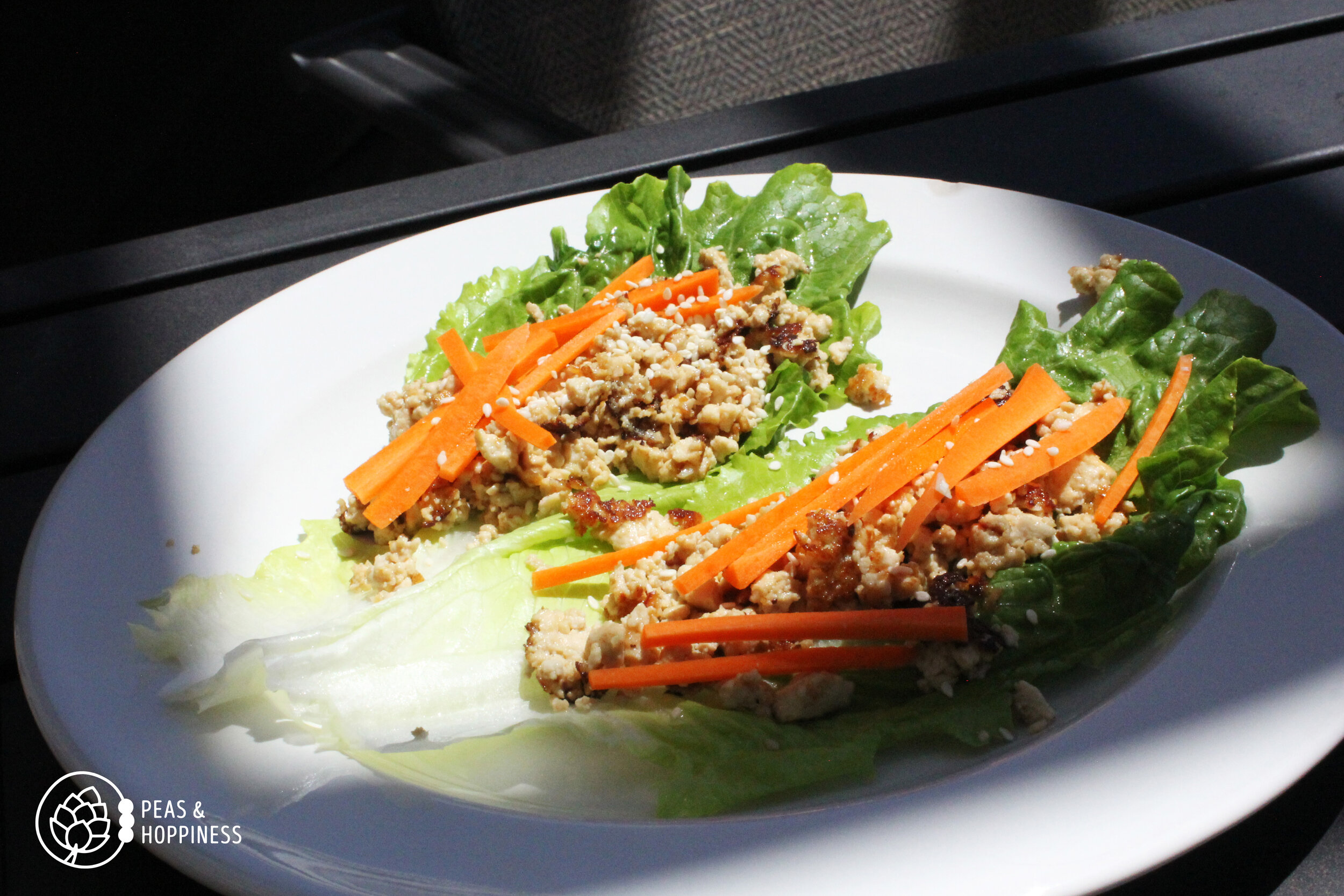
Asian Tofu Lettuce Wraps using tofu crumbles, featured on the Vegetarian Peas & Hoppy Meal Guides. Tofu crumbles are a simple, minimally processed vegan protein which assumes the flavor of whatever you add to it.
How the Vegetarian Diet Works
There is significant variation in the quality of vegetarian diets, which has made it difficult to ascertain the health benefits of a diet absent of animal products (1). If a person reduces animal products in his or her diet, these will be replaced by something. When animal proteins are replaced with plant-based proteins including beans, lentils, soy, and whole grains, the overall quality of the diet is usually improved.
Studies show vegetarian diets tend to be higher in fiber, a variety of vitamins and minerals, and antioxidants. At the same time they are lower in cholesterol, total fat, and saturated fat (5, 6). Because of these dietary improvements, the vegetarian diet has been associated with reducing the risk of many different chronic health conditions, including diabetes, heart disease, and cancer (7, 8).
The Seventh Day Adventist religion encourages its members to follow a vegetarian diet, out of which was born the Adventist Health Study. Because of the large number of participants and quality of data, this large population-based study has provided much insight into the possible benefits of the vegetarian diet.
Reduced risk of Type 2 Diabetes
Red and processed meats are strongly associated with an increased risk of type 2 diabetes, as they correlate with higher fasting blood sugar and insulin concentration (1). This may be related to the saturated fat content, nitrates, heme iron, and other components of meat (1). Vegetarians also are more likely to have a lower BMI which has been linked to reduced risk of type 2 diabetes. Even independent of weight, a vegetarian diet still showed a protective effect, likely related to the reduction in saturated fat and increase in fruits and vegetables (8). At the same amount of calories, vegan participants in a randomized controlled trial showed improvements in insulin sensitivity, reduction in fat, and lower inflammatory markers than participants who consumed a conventional diabetic diet (1).
The Adventist Health Study-2 found an association between a strict vegetarian diet and reduced risk of obesity and type 2 diabetes. Churchgoers were divided into type of vegetarian diet; it was found that the most strict vegans had the lowest BMI and lowest risk of having type 2 diabetes. The risk increased incrementally as more animal products were added to the diet: lacto-ovo, pescatarian, semi-vegetarian, and non-vegetarian, respectively. However, compared to a non-vegetarian diet, all plant-based diet types were associated with lower risk of type 2 diabetes. This held true even after adjusting for socioeconomic and lifestyle factors (1, 8).
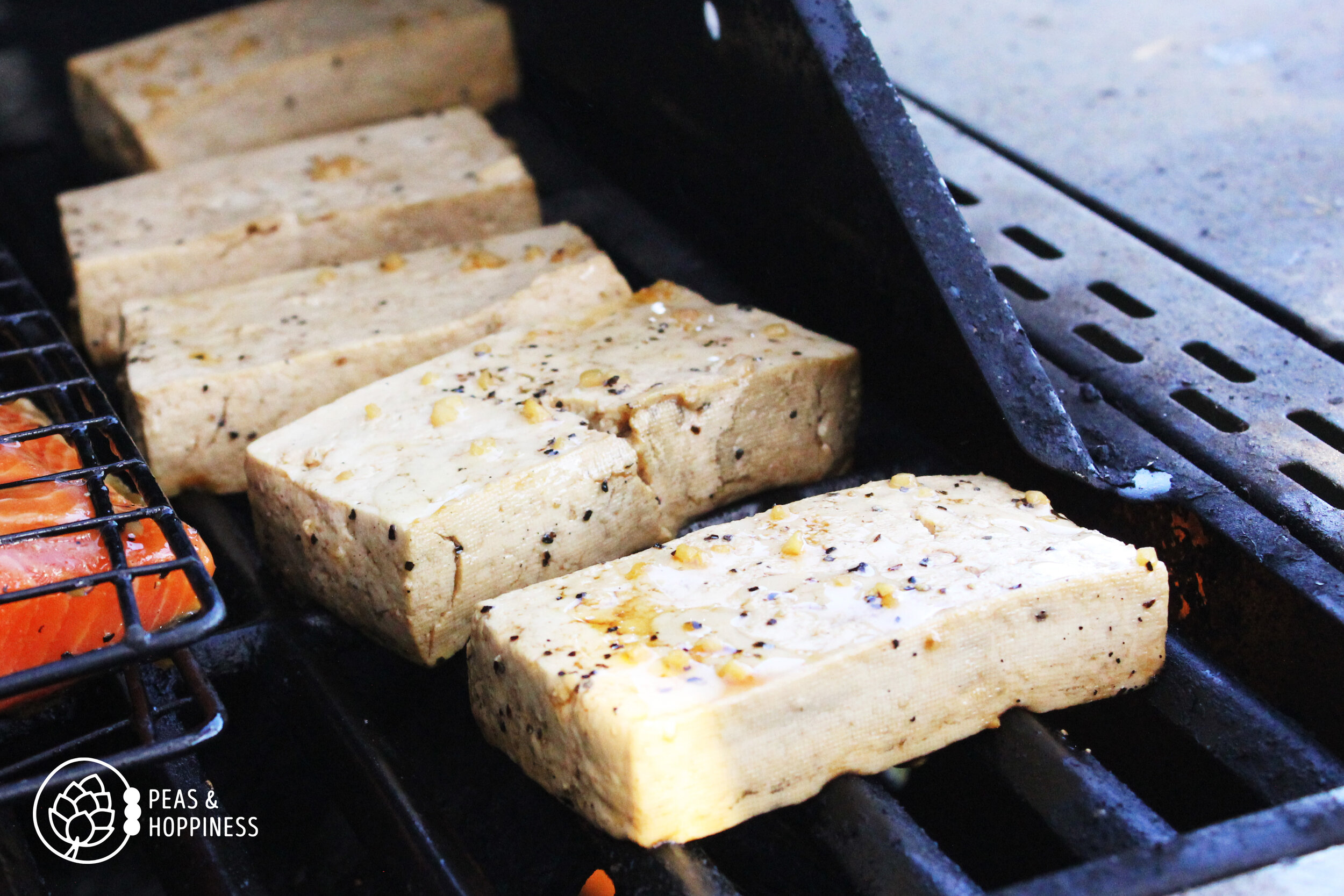
Soy protein, such as tofu, includes phytoestrogens which have been hypothesized to lower risk of breast cancer
Reduced risk of Heart Disease
Vegetarian diets have shown a correlation with improved blood pressure, better lipid profile (meaning better blood cholesterol), and blood glucose (6). They also generally show a reduction in inflammation, measured by c-reactive protein and atherosclerosis (hardening of the arteries) (1). In fact, a low-fat vegan or vegetarian diet has been shown to reverse atherosclerosis when combined with other lifestyle factors such as not smoking (1).
Reduction in these numbers provide protection against heart disease. It’s thought this occurs due to the low saturated fat in the diet and higher fiber from plant-based proteins, as some substitutions for animal products can make a big difference in health risk (6). For example, switching red meat with a serving of nuts has been shown to reduce the risk of coronary heart disease by as much as 30% (5).
Reduced risk of Cancer
Fruits, vegetables, and plant-based proteins contain more fiber, antioxidants, and other phytochemicals, all of which have been shown to reduce the risk of cancer. Eating a vegetarian diet may reduce overall risk of cancer and some studies have show specific reduction in risk of gastrointestinal cancer, prostate cancer, breast cancer, and colorectal cancer (1).
Seventh-day Adventists have a lower cancer risk than the general population, likely linked to the low use of alcohol, the low intake of meat even among non-vegetarians, and the low use of tobacco. Even among this group, a vegan diet correlated with lower risk of female-specific cancers. Part of the cause of this may be the use of soy as a protein source, whose phytoestrogens have been hypothesized to lower risk of breast cancer (7).
Lacto-ovo vegetarians in the study had a lower risk of gastrointestinal cancers, suggesting that dairy may lower the risk of these types of cancers (B). Although they don’t specifically recommend a vegetarian diet, the American Institute for Cancer Research recommends to consume vegetables, fruits, whole grains, and beans for two-thirds of the diet (1).
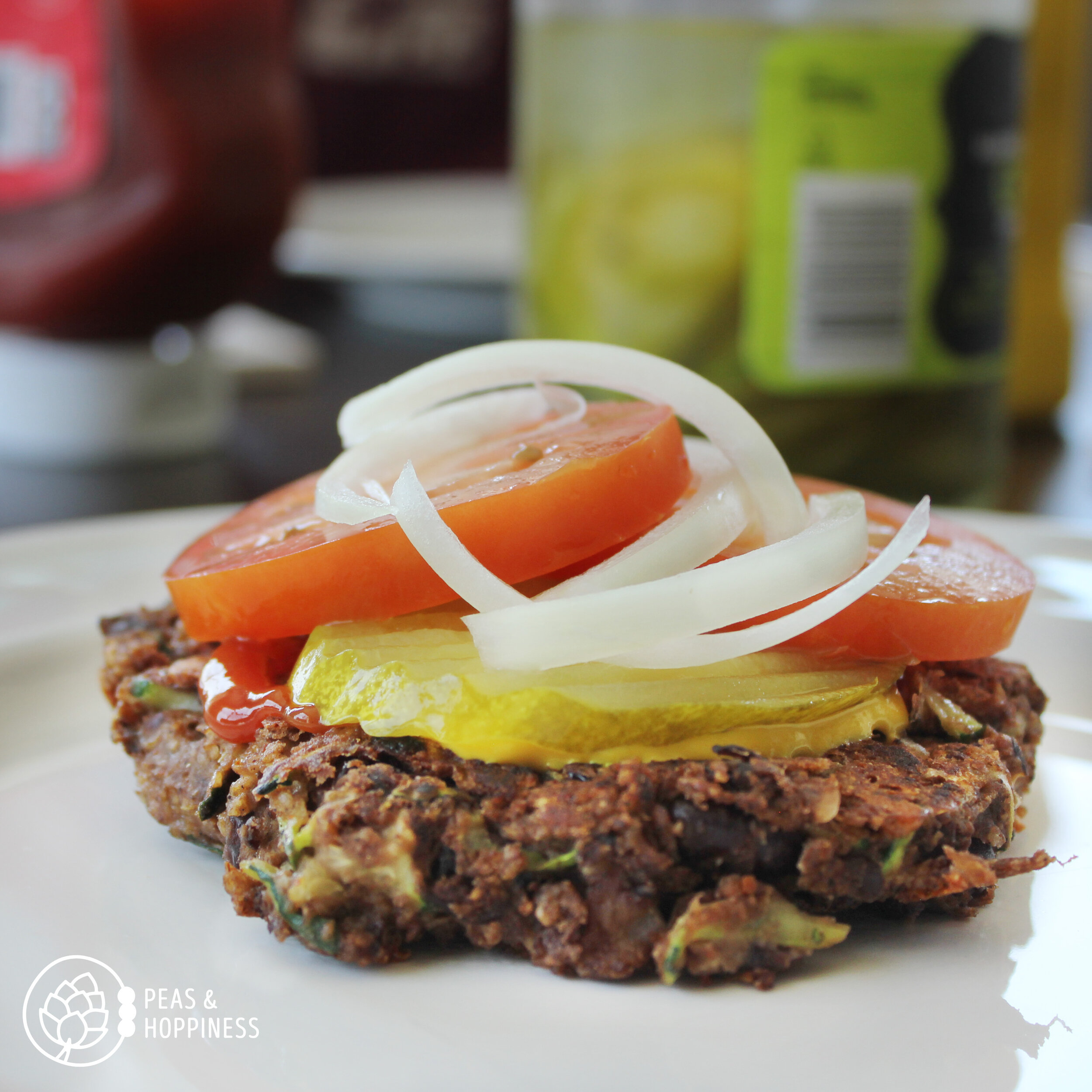
Homemade Cheddar Black Bean Burgers, a delicious alternative to traditional beef burgers.
Possible Ecological Benefits of the Vegetarian Diet
A common reason for switching to a vegan or vegetarian lifestyle is not related to health, but rather related to environmental sustainability. Scientists estimate about a quarter of greenhouse gas emissions come from food production, of which about half are related to animal products (9, 10). Consuming plant-based protein in place of animal protein has been suggested by scientists to slow or reverse climate change (1).
Generally, eating lower on the food chain is an easy way to think of how different foods affect the environment. Red meat is the least efficient protein type in terms of greenhouse gas emissions per kilogram of protein produced (11) and beef and lamb account for about half of greenhouse gas emissions from animal products (9, 10). This is because a large bovine requires significantly more water and food than a chicken, which is reflected in the environmental impact. Better yet, eating the plant – rather than eating the animal that ate the plant – is more sustainable yet (10).
Precautions to Take with the Vegetarian Diet
Depending on why type of vegetarian diet a person chooses, there are possibilities for nutrient deficiencies to be aware of and monitor before starting this diet.
Iron: to avoid iron deficiency, it’s important for vegetarians to include plant-based sources of iron include green leafy vegetables, legumes, and fortified foods. In a well-rounded vegetarian diet, vegetarians typically consume equal to or sometimes more iron despite avoiding meat, a major source of iron for omnivores (1). Although it was previously thought plant-based iron sources, such as from spinach or black beans, were not as readily absorbed, recent research indicates individuals can adapt to absorb this type of iron more effectively. In addition, having lower blood iron (serum ferritin) levels may be protective by reducing the risk of metabolic syndrome (1).
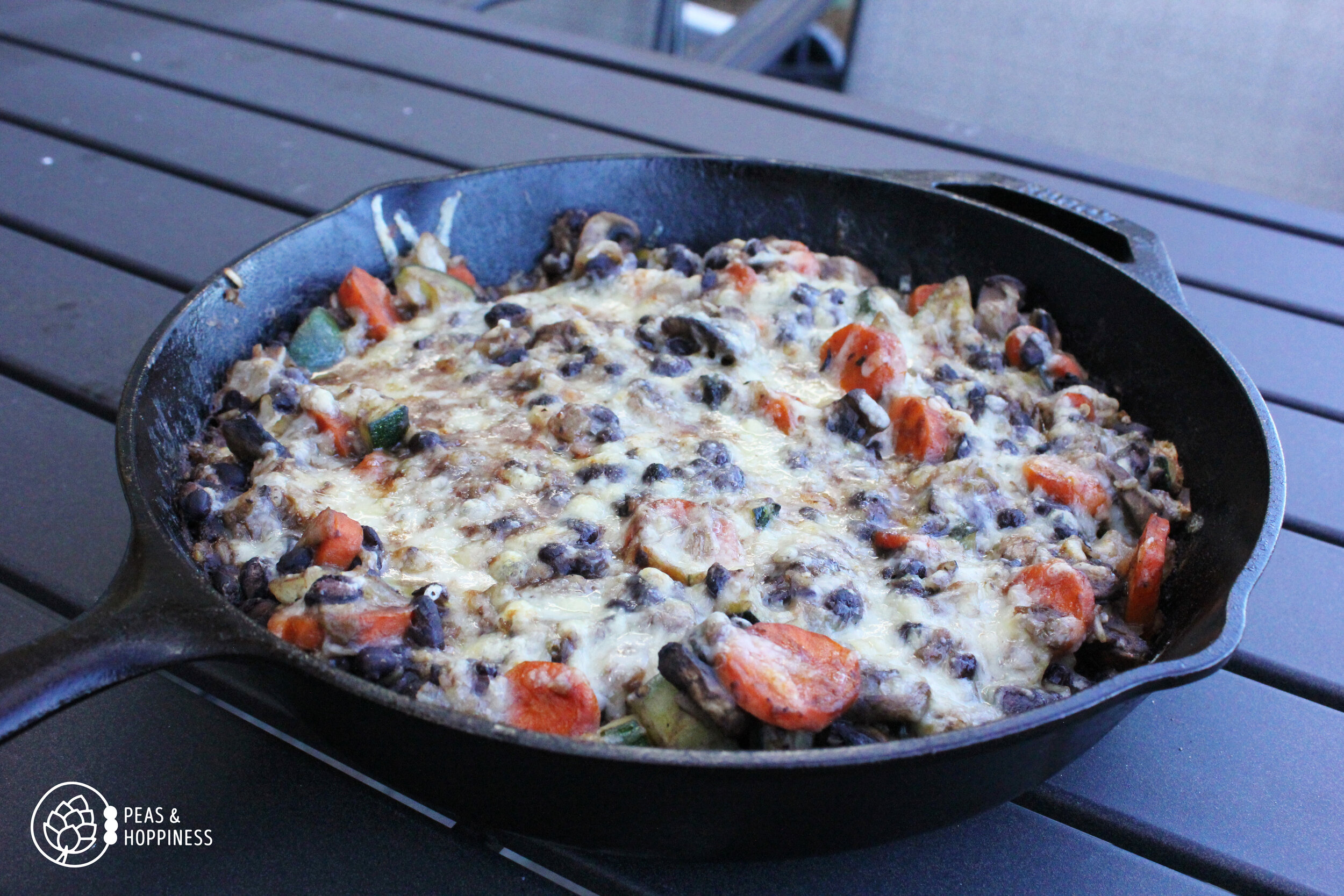
Black Bean & Harvest Vegetable Skillet featured on the Peas & Hoppy Meal Guides, a one-dish meal which can be served as an entree or as a side to round out a flexitarian meal.
Vitamin B12: vitamin B12 is found only in animal foods or bacteria (12). Because everyone (hopefully) washes their fruits and vegetables before consumption, vegans – and most vegetarians – must consume a supplement of this vitamin. Recommendations for supplementation are to take 500 to 1,000 micrograms of cyanocobalamin several times per week (1).
Protein: protein intake is usually adequate on a vegetarian diet when a person is consuming enough calories (1). It’s possible for restrictive vegetarian diets to be deficient in protein if the main source of calories are refined grains and vegetables. In order to consume all 20 essential amino acids, vegetarians need to consume a variety of legumes (beans, lentils, peanuts) and grains (quinoa, whole grain pasta, brown rice). Not-meat animal products such as dairy and eggs are good sources of protein. Read more about complimentary proteins.
Omega-3 Fatty Acids: these essential fatty acids are linked to a multitude of health benefits, from lowering risk of heart disease to supporting cognitive function. These are found in plant-based foods such as flax or chia seeds and walnuts, but are more readily available for the body from fatty fish like salmon or tuna. Avoiding fish could increase the possibility of deficiency of this nutrient (1).
Possible Drawbacks of the Vegetarian Diet
Pop Quiz: Which of these items is vegan?
A) Potato Chips
B) Oreos
C) Triscuits
Trick question; the answer is D) All of the Above.
One of the potential downsides of the vegan or vegetarian diet is that there are many processed foods available which don’t contain any animal products, but are also devoid of nutrition. My favorite flexitarian client has deftly named this, “Junk Food Vegan.”
Simply put, if a person switches from a high-meat, high-processed carb diet to a legume-filled, fruit-and-veggie-filled vegetarian lifestyle, that person will see a multitude of benefits. It’s still unclear, however, whether cutting out the animal products is what effected these changes or if it’s because the overall diet pattern is healthier (5). Additionally, foods like fatty fish (salmon, tuna), dairy, and eggs all have some evidence to lower the risk of heart disease; removing them from the diet is not necessarily a healthy choice (5).
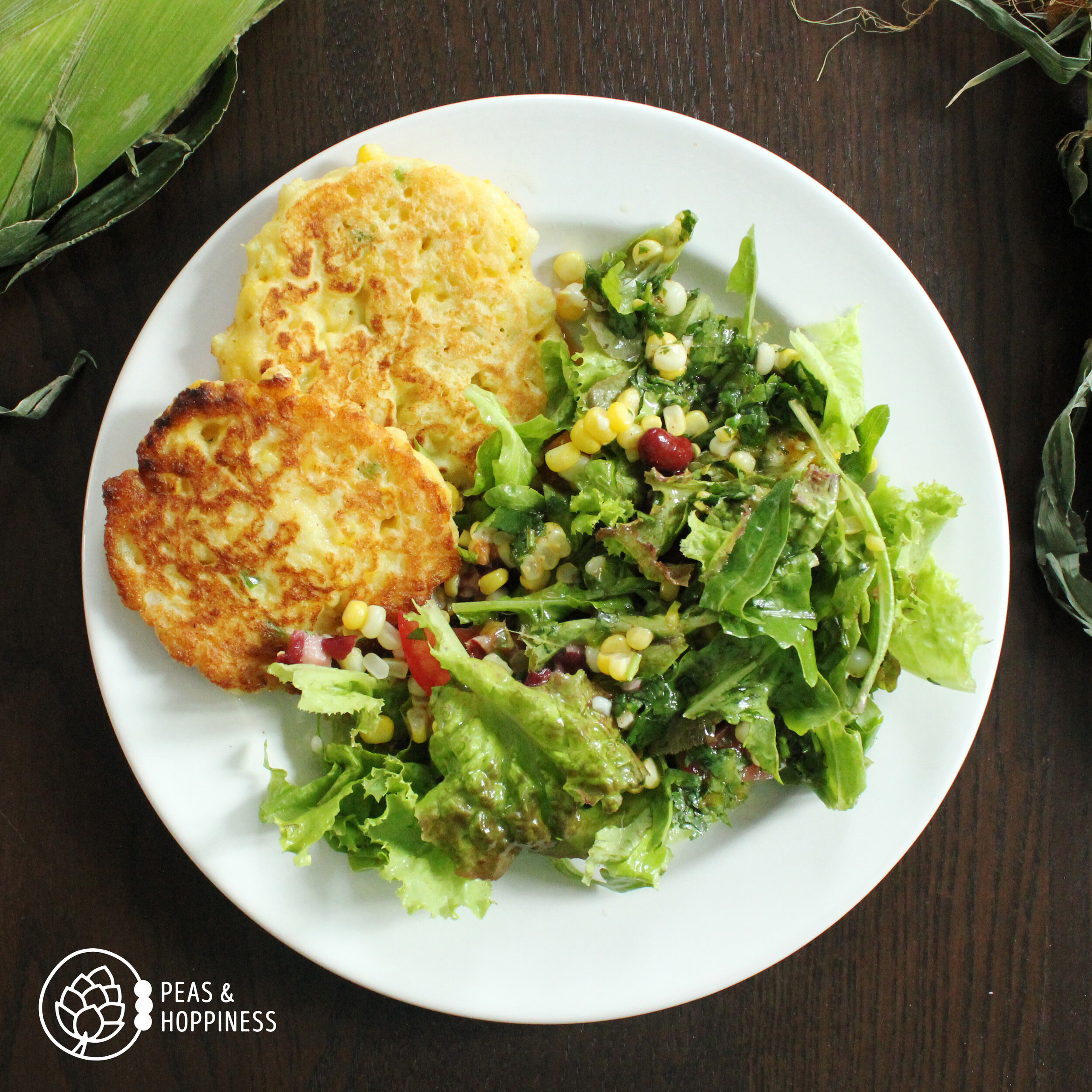
Delicious vegetarian summer meal: Corn Fritters & Southwest Salad
Vegetarian Diet: Overall Grade
Health Benefits: A (for a well-balanced vegetarian diet, but variable depending on diet quality)
Ease of Maintenance:
Lacto-Ovo Vegetarianism: B
Veganism: D
The health benefits of a well-balanced vegetarian or vegan diet are significant, but this can be highly variable depending on the diet quality and if a person is including all of the nutrients. A vegetarian diet which includes beans, lentils, and soy for protein with the bulk of calories coming from whole grains, fruits, and vegetables and is relatively low in processed flour and sugar is an incredibly healthy diet. A vegetarian diet which relies mainly on white pasta, faux meat products, and potato chips isn’t going to have the same results and is going to result in a number of nutritional deficiencies.
Lacto-Ovo Vegetarianism receives a “B” rating because while it can be challenging to find flavorful alternatives to animal products, even my friend who lives in rural Kansas has found a way to make this possible. Veganism receives a much lower rating because in order to be nutritionally complete AND completely avoid all animal products, one has to be extremely vigilant about their diet. It’s certainly possible to maintain a vegan diet, but one needs to be very committed.
What we do know is eating fewer animal products, especially red meat and dairy, is beneficial to the environment. If you’re not ready to give up meat entirely, switching to chicken or fish and including more plant-based meals can be a great place to start. Reducing food waste and eating seasonally is also an important part of reducing your environmental footprint (10).
If I were to advise my readers on whether or not to switch to a vegetarian diet, I must return to my favorite quote by author Michael Pollan: “Eat real food. Not too much. Mostly plants.” If for you that means avoiding meat, you have my blessing to eat legumes and soy.
If you’re looking for a healthy, balanced way to switch to a vegetarian lifestyle, check out the Peas & Hoppy Meal Guides. Choose the Vegetarian guide for a lacto-ovo vegetarian option or enjoy the Healthy Plate guide which includes meat and fish, but also includes at least one vegetarian meal every week to help you eat lower on the food chain.
Check out this free 1-week vegetarian meal guide with recipes to see if it’s right for you!
Whatever you choose, go forth and eat more plants.
Happy plant eating,
Ann
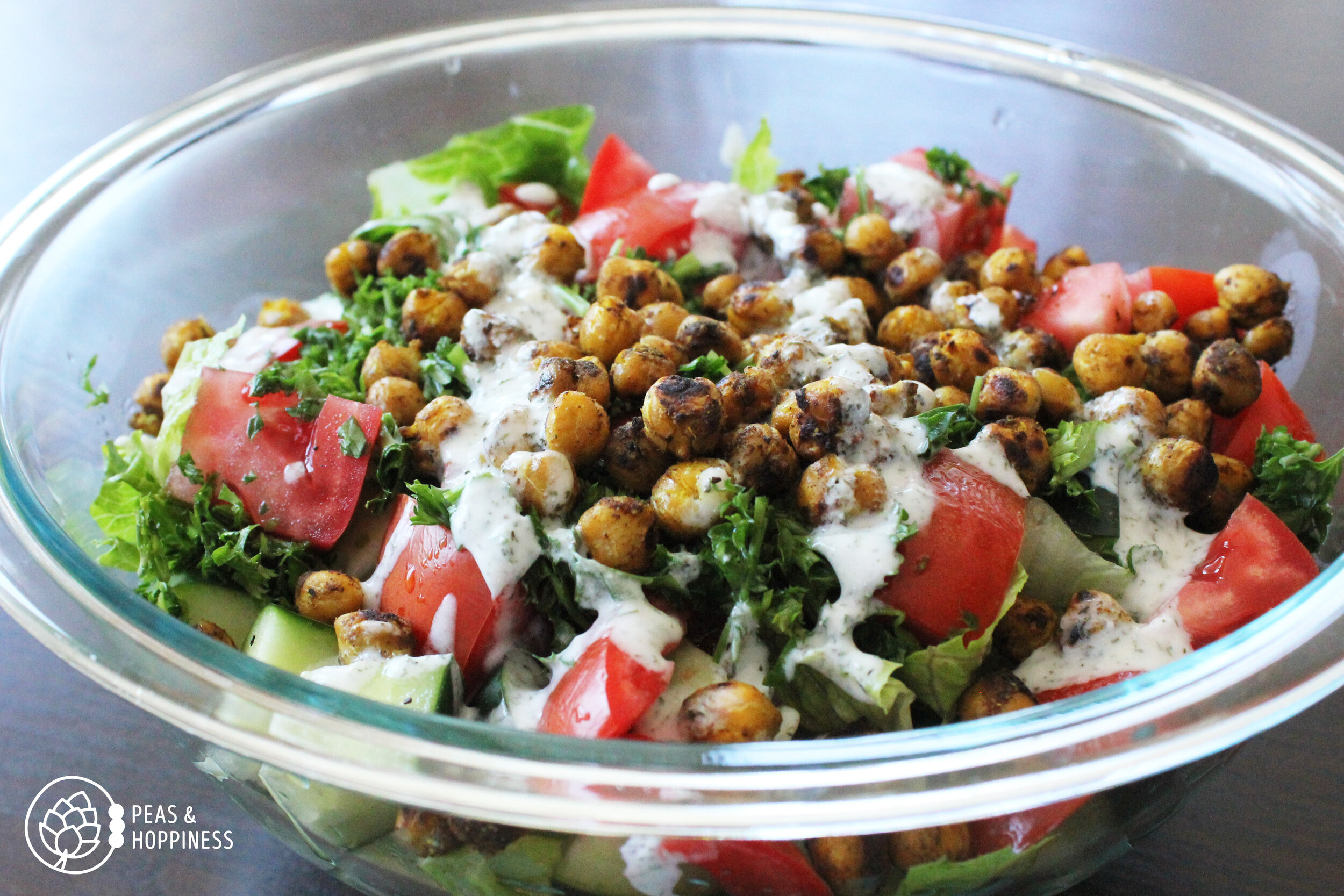
Using chickpeas in place of meat is a delicious, protein-filled way to eat lower on the food chain and reduce the environmental impact of one’s diet. Chickpea Shawarma Bowls featured on the Vegetarian Peas & Hoppy Meal Guide
Sources
1. Melina, Vesanto, et al. “Position of the Academy of Nutrition and Dietetics: Vegetarian Diets.” Journal of the Academy of Nutrition and Dietetics, vol. 116, no. 12, 2016, pp. 1970–1980., doi:10.1016/j.jand.2016.09.025.
5. Parker, H. W., & Vadiveloo, M. K. (2019). Diet quality of vegetarian diets compared with nonvegetarian diets: A systematic review. Nutrition Reviews, 77(3), 144-160. doi:10.1093/nutrit/nuy067
6. Wang, Fenglei, et al. “Effects of Vegetarian Diets on Blood Lipids: A Systematic Review and Meta‐Analysis of Randomized Controlled Trials.” Journal of the American Heart Association, vol. 4, no. 10, 9 Sept. 2015, doi:10.1161/jaha.115.002408.
7. Tantamango-Bartley, Y., et al. “Vegetarian Diets and the Incidence of Cancer in a Low-Risk Population.” Cancer Epidemiology Biomarkers & Prevention, vol. 22, no. 2, Feb. 2013, pp. 286–294., doi:10.1158/1055-9965.epi-12-1060.
8. Tonstad, S., et al. “Type of Vegetarian Diet, Body Weight, and Prevalence of Type 2 Diabetes.” Diabetes Care, vol. 32, no. 5, May 2009, pp. 791–796., doi:10.2337/dc08-1886.
9. Stylianou, Nassos, et al. “Climate Change Food Calculator: What’s Your Diet’s Carbon Footprint?” BBC News, BBC, 9 Aug. 2019, www.bbc.com/news/science-environment-46459714.
10. Esposito, Lisa. “Best Diets for the Environment.” U.S. News & World Report, 20 Feb. 2019, 11:06 AM, health.usnews.com/wellness/food/articles/best-diets-for-the-environment.
11. Mbow, Cheikh, et al. “Food Security. In: Climate Change and Land: an IPCC Special Report on Climate Change, Desertification, Land Degradation, Sustainable Land Management, Food Security, and Greenhouse Gas Fluxes in Terrestrial Ecosystems.” Intergovernmental Panel on Climate Change, United Nations, 2019, www.ipcc.ch/srccl/chapter/chapter-5/.
12. Joshi, Shivam. “Why Every Vegan and Vegetarian Needs Vitamin B12.” Forks Over Knives, 19 Mar. 2019, www.forksoverknives.com/wellness/every-vegan-vegetarian-needs-vitamin-b12/.